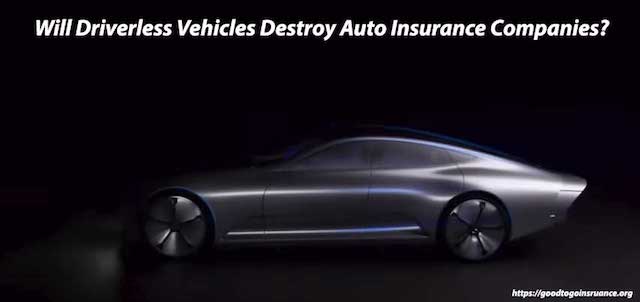Will driverless vehicles destroy auto insurance companies?
If you’ve lived in Silicon Valley the past few years, you might not be surprised to look over your shoulder and see a driverless vehicle next to you at a red light. For many Americans though, they still freak out at self-driving cars. Some people in rural areas have never even heard of them and surely would think it’s a ghost driving.
These new high-tech cars are for real and will transform the automotive industry in the coming decades. The debate is not when but how fast it will happen. Technology moguls like the CEO of Tesla Motors, Elon Musk, have made bold predictions about the death of human-powered vehicles.
Autonomous Cars Could Take Over in Just 20 Years According to Elon Musk
While many technology futurists think human driven cars will still be sold in 30 and even 40 years, Musk has an entirely different vision. He thinks all cars sold within 20 years will be autonomous. That is a bold prediction that may or may not be true. If it’s accurate, then major industries will get hit hard by this paradigm shift in technology.
Auto Insurance Companies will be Heavily Impacted by Self-Driving Cars
One such business model that has been around since the first days of the Model T car is auto insurance. This begs the question; will driverless vehicles destroy auto insurance companies? The answer is yes if Elon Musk has anything to do with it. Self-driving vehicles will eliminate 99.9% of vehicular accidents.
This raises the obvious question; will these cars need to be insured? If only 1 car in 10,000 ever gets into an accident, then why would they need to be covered? This hits the $500 billion auto insurance industry right smack in the head. They have reason to be afraid, very afraid. It also has smaller insurers like GoodtogoInsurance.org concerned. The faster car insurers adapt to the coming trend of driverless vehicles, the more likely they will stay in business.
Autonomous Vehicle Technology is Improving and Becoming Safer
Current self-driving automobiles are safe, and they are getting safer with each update. Yes, there have been a handful of collisions since they hit the road, but very few fatalities. Musk thinks the only human cars sold after 20 years will be for sentimental reasons. He equates it to a horse. Most people today ride horses for fun, not to go to the local Wal-Mart and shop. Musk sees the same thing happening to cars. People will only keep them to remind themselves of how crazy it was that people actually drove cars at one time!
Other technology futurists are not so certain about the 20-year prediction Elon Musk has made. In a recent poll, only about 40% of respondents said they would feel comfortable riding in an autonomous vehicle. For senior citizens over 65, that number goes way down to below 10%. To think that that vast majority of people who have been driving for years will make the switch in just 20 years might be a bit too optimistic.
It Might Take up to 40 Years for Driverless Cars to Take Over
Some experts think it will take between 30 and 40 years for human-driven vehicles to be fully replaced. One issue is the increased quality of current automobiles. For motorists that drive less than 1,000 miles per month, a new car can easily last 15 years or more. Automobiles just last a lot longer than they did 20 years ago.
Another factor is fear itself. Millions of people will just refuse to buy a car that drives itself. Two groups of people will be pulling the automotive industry in the future: those who are only interested in driverless cars and consumers who want regular human-driven vehicles. At some point, perhaps 25 years from now, politicians might start passing laws that outlaw human-driven cars.
Automobile Manufacturers are Embracing Autonomous Technology
One thing is for sure, more and more autonomous cars will be filling the roads in the coming years. This is a certainty. Almost all of the major automakers have made big investments in the technology. This includes industry heavyweights like BMW, Ford, Mercedes, and Toyota.
Insurance Companies Need to Adapt Fast
Large Insurers like State Farm and Geico are not positioned for this transformation. They are worried about self-driving cars will drastically reduce the premiums they can charge. Many experts are predicting most auto insurance companies will be out of business in 20 years.
The carriers that stay in business will need to re-focus on insuring autonomous vehicles. Companies that adapt the fastest, stand a chance of gaining more market share. Those that do not, might die a slow death. The next two decades will be full of disruption and technological change, especially for auto insurers.

